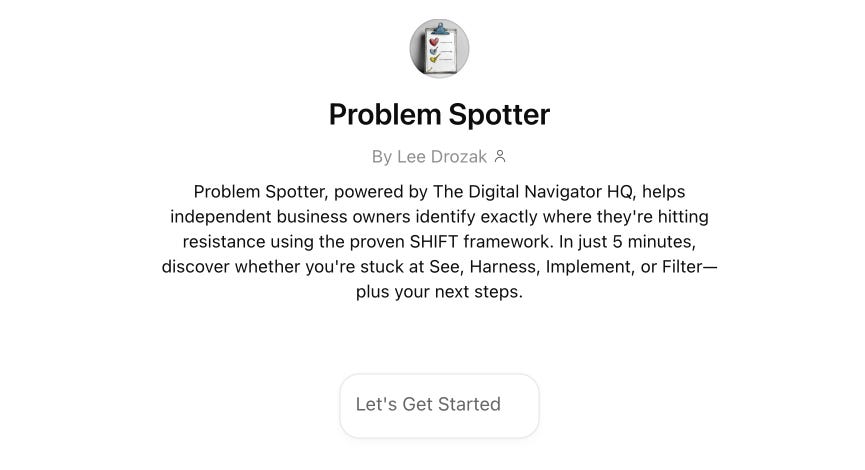When Failure Teaches the Wrong Thing
The problem with "learning from mistakes" isn't the learning—it's what we choose to analyze.
There's that split second before everything changes—when gravity takes over and you realize there's no going back. I was flying down a steep hill on my bike after a heavy rainstorm, feeling that perfect rush of fearless curiosity that defined my childhood.
Right until I squeezed the brake handles and nothing happened.
You know that feeling when you're committed to something and suddenly realize you're completely unprepared? That stomach-drop moment when the thing you thought would work... doesn't?
When the Obvious Comes Too Late
Growing up, I was fearless and curious, so I was always getting myself into predicaments, as my mom would say. Some led to broken bones or groundings, others to pats on the back or an "atta girl." This particular one included a bike ride down a steep hill after a heavy rainstorm.
The hill was slick with fresh rain, and I was picking up speed fast. The obvious kicked in too late—wet roads, steep hill, broken brakes. Classic recipe for disaster.
Which led to a hospital visit and an arm cast for the summer. The lesson seemed crystal clear: check your brakes before riding a bike down a hill, especially when the roads are wet.
The Lesson That Wasn’t the Lesson
But here's what I wasn't prepared for.
The funny thing about lessons is they're not learned until after the fact. Should I have ridden the bike without brakes? That's a big no. Should I have done things differently, like check the brakes first? Yes, why yes, I should have.
But the real question dawned on me later: should I have even been on the bike in the first place?
That answer was no—not because of the weather or the brakes, but because I was not supposed to be on the bike in the first place.
What We Miss When We Only Analyze the Crash
What hit me years later wasn't about better safety checks or improved decision-making skills.
"I was looking at the outcomes and not the parameters of what got me here," I realized, deep into running my own business.
It wasn't so much that the bike was forbidden. However, sometimes we analyze the crash without questioning whether we should have been on that particular path at that moment, given everything else that was happening.
I'd spent years thinking about checking the brakes when I should have been questioning the entire scenario.
Stop Fixing the Wrong Thing
Here's what drives me crazy about most business advice: we're obsessed with fixing our execution when we should be questioning our parameters.
Every week, I talk to others doing exactly what young me did. They're analyzing their "brake failures"—why their launch flopped, why their marketing didn't convert, why their strategy felt so hard to implement.
But they're asking the wrong questions:
"How can I improve my email open rates?" instead of "Should I even be focusing on email right now, given my current situation?"
"What's wrong with my sales process?" instead of "Are the parameters of my business supporting this approach?"
"Why didn't this strategy work for me?" instead of "Should I have been pursuing this strategy in the first place?"
The most successful business owners I know aren't better at execution. They're better at reading their parameters before they commit to the hill.
Someone Who Asked a Better Question
Kim Doyal from The Business Within: Kim could have continued to perfect her WordPress expertise and doubled down on what she was "supposed" to do as an established business owner.
Instead, she stepped back and asked a different question: what actually energizes me now? The answer led her to embrace AI and pivot to "vibe coding"—not because the old way was broken, but because the parameters of what fulfills her had shifted.
Even as GenXers, we don't have to follow the playbook of playing it safe. Sometimes the real change isn't about better execution—it's about bucking the norm for what lights you up.
The Real Lesson
The best business decisions aren't about having better brakes—they're about recognizing when you shouldn't be on the bike.
Sometimes the real lesson isn't about doing things differently. It's about questioning whether you should be doing them at all.
The Reframe That Changes Everything
This isn't about being more cautious or overthinking every decision. It's about looking at outcomes and parameters, not just tactics and execution.
Instead of: "How can I do this better?"
Ask: "Should I even be doing this given my current parameters?"
Instead of: "What went wrong with my approach?"
Ask: "Was I supposed to be on this path in the first place?"
What I Wish I’d Known Sooner
Here's what I wish someone had taught me earlier: most business struggles aren't execution problems—they're parameter problems.
What if your biggest challenge isn't that you need better tactics, but that you need to identify where you're actually stuck in the decision-making process?
Think about your last business "failure." Were you fixing the brakes or questioning whether you belonged on that bike?
A Better Way to Find Your Stuck Point
Stop guessing where you're stuck. I created the Problem Spotter specifically for this—it uses the proven SHIFT framework to help you identify exactly where you're hitting resistance in just 5 minutes.
Because here's what I've learned: you can't fix a problem you haven't properly identified.
Take the Problem Spotter Quiz - Find out if you're stuck at See, Harness, Implement, Focus and Filter, or Take Stock. Take the quiz.
Get your specific next steps based on your actual stuck point, not where you think you should be
Stop wasting time on solutions that don't match your real challenge
Don’t Just Work Harder. Think Smarter.
Ready to stop fixing the wrong things?
Make your next business move with confidence. I provide 'thinking partners' that help you filter out the hype and focus on the simple, right-for-you actions to grow your business.
Curious what a 'thinking partner' is? Try my free customGPT and experience one for yourself. It's a simple, guided chat that will give you clarity on your biggest challenge in the next few minutes.
Because sometimes the best lesson isn't about better execution—it's about better questions.




Thanks for the mention, Lee!
There's a bit of a learning curve but it's soooo worth it to follow what truly lights me up!